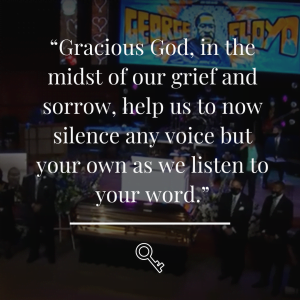

"Gracious God, in the midst of our grief and sorrow, help us to now silence any voice but your own as we listen to your word."
During my 30 plus years as a pastor in different congregations, certain tragic events took place that required an immediate shift in focus as to what I planned to preach the following Sunday morning. The scope of the
tragedy, whether congregational, regional, national, or global had less to do with the change of plans as did the pain and confusion suffered by those most affected. The most recent tragedy and response surrounding the murder of George Floyd would rank high among those events that cause everything else to take a backseat.
Part of me wonders what I can add to the volume of commentaries being poured out these days in every form of the media. I am white, affluent, and blessed in every way so some may think I have no right to comment. And I would agree except to say that my reflections have nothing to do with my so-called racial and socio-economic identity and everything to do with my membership in the fraternity of suffering and grief that agitate the minds of all people in the wake of injustice.
I have officiated hundreds of funerals, memorials, and graveside services. I have attended many others. One of the prayers I have prayed before scripture readings and the sharing of a message was, “Gracious God, in the
midst of our grief and sorrow, help us to now silence any voice but your own as we listen to your word.” That is what I have needed to do every day, maybe every hour, since witnessing the callous, dark-hearted, and horrific treatment of George Perry Floyd.
I know I cannot preach a sermon in this context, but I can point us to the word of a person whose own experiences mirror ours today. I would encourage the full reading of Psalm 143 in the Old Testament of the Bible but will highlight a few verses:
Hear my prayer, O Lord…for the enemy has pursued me, crushing my life to the ground, making me sit in darkness like those long dead. Therefore, my spirit faints within me; my heart within me is appalled.
What can we learn from these lines of the psalmist’s prayer? At least two things:
1. That there are times when the most immediate and necessary response to our sense of the tragic is a gut-level, honest-to-God prayer. One person said, “We don’t really pray until we have to.” The words expressed in this prayer could serve as a caption of both the local cause and national effect of this past week. That is not to say that we should not do other things, like collectively make our voices heard. Other places in the Bible command us to expose the unfruitful works of darkness (Ephesians 5:11). But unless we frame our individual and collective lament with a Christ-centered focus it can easily devolve into self-righteous anger and only cause more pain to ourselves and others. Psalm 143:2 ends with this: “…for no one living is righteous before you.” When we are in the throes of anger, grief, and feelings of helplessness, and feel so bottled up we want to scream, honestly turning our focus away from our pain and upward toward God is anything but simple. In Psalm 143, the word Lord or a pronoun referring to God is used 24 times in 12 verses. God is deeper than our depths.
2. In turning toward God, we need to speak our pain so that later we can speak it well to others. In his book, The Search for Compassion, author Andrew Purves writes, “expressed pain is no longer as devitalizing and demoralizing as secret, private pain. The critical stage in the healthy handling of suffering, moving from reactive to proactive, is the stage of lament, of articulation, in which suffering is expressed, in which it is named and owned. It is the indispensable step away from powerlessness and toward a sense of having some control over one’s destiny.”
That is what was happening at the televised Life Celebration of George Floyd on June 4th in Minneapolis. One task of the church is not to take away pain, it is to enter into it and mold it so that it can be shared. In remarkable way that seems to be happening in the collective conscience of our nation. It seems to me to be a true turning point even though arrival at the desired destination may take a long time.
A paraphrase of the rest of Psalm 143 would include something like this: “God, I know you are with me in this life, hard as it is. I am hanging onto you and believing it is your nature and desire to guide, deliver and lead me through dark times by your Spirit. Erase and destroy all those things which are opposed to your righteousness; bottom line – I’m your servant; I belong to you.”
One final thing. The reason I have been volunteering with unCUFFED going on five years now, the reason I try and make it into The Charles Hickey School most Tuesday evenings, has little to do with my own “goodness.” It has everything to do with a sense of call to enter into solidarity with the suffering and inequities experienced by those we serve, guilty as they may be. But I would not feel any of that or be sustained to continue apart from the conviction that God in Christ has entered into solidarity with us. A belief is something we hold; a conviction is something which holds us. unCUFFED is quick to declare that those who work and volunteer in detention centers and elsewhere are held by the deep conviction that only God can take on the ills of this world and not be crushed by them. Every tragedy is God’s megaphone calling us to join Him in bringing comfort and change to others in His name.

"Gracious God, in the midst of our grief and sorrow, help us to now silence any voice but your own as we listen to your word."
During my 30 plus years as a pastor in different congregations, certain tragic events took place that required an immediate shift in focus as to what I planned to preach the following Sunday morning. The scope of the
tragedy, whether congregational, regional, national, or global had less to do with the change of plans as did the pain and confusion suffered by those most affected. The most recent tragedy and response surrounding the murder of George Floyd would rank high among those events that cause everything else to take a backseat.
Part of me wonders what I can add to the volume of commentaries being poured out these days in every form of the media. I am white, affluent, and blessed in every way so some may think I have no right to comment. And I would agree except to say that my reflections have nothing to do with my so-called racial and socio-economic identity and everything to do with my membership in the fraternity of suffering and grief that agitate the minds of all people in the wake of injustice.
I have officiated hundreds of funerals, memorials, and graveside services. I have attended many others. One of the prayers I have prayed before scripture readings and the sharing of a message was, “Gracious God, in the
midst of our grief and sorrow, help us to now silence any voice but your own as we listen to your word.” That is what I have needed to do every day, maybe every hour, since witnessing the callous, dark-hearted, and horrific treatment of George Perry Floyd.
I know I cannot preach a sermon in this context, but I can point us to the word of a person whose own experiences mirror ours today. I would encourage the full reading of Psalm 143 in the Old Testament of the Bible but will highlight a few verses:
Hear my prayer, O Lord…for the enemy has pursued me, crushing my life to the ground, making me sit in darkness like those long dead. Therefore, my spirit faints within me; my heart within me is appalled.
What can we learn from these lines of the psalmist’s prayer? At least two things:
1. That there are times when the most immediate and necessary response to our sense of the tragic is a gut-level, honest-to-God prayer. One person said, “We don’t really pray until we have to.” The words expressed in this prayer could serve as a caption of both the local cause and national effect of this past week. That is not to say that we should not do other things, like collectively make our voices heard. Other places in the Bible command us to expose the unfruitful works of darkness (Ephesians 5:11). But unless we frame our individual and collective lament with a Christ-centered focus it can easily devolve into self-righteous anger and only cause more pain to ourselves and others. Psalm 143:2 ends with this: “…for no one living is righteous before you.” When we are in the throes of anger, grief, and feelings of helplessness, and feel so bottled up we want to scream, honestly turning our focus away from our pain and upward toward God is anything but simple. In Psalm 143, the word Lord or a pronoun referring to God is used 24 times in 12 verses. God is deeper than our depths.
2. In turning toward God, we need to speak our pain so that later we can speak it well to others. In his book, The Search for Compassion, author Andrew Purves writes, “expressed pain is no longer as devitalizing and demoralizing as secret, private pain. The critical stage in the healthy handling of suffering, moving from reactive to proactive, is the stage of lament, of articulation, in which suffering is expressed, in which it is named and owned. It is the indispensable step away from powerlessness and toward a sense of having some control over one’s destiny.”
That is what was happening at the televised Life Celebration of George Floyd on June 4th in Minneapolis. One task of the church is not to take away pain, it is to enter into it and mold it so that it can be shared. In remarkable way that seems to be happening in the collective conscience of our nation. It seems to me to be a true turning point even though arrival at the desired destination may take a long time.
A paraphrase of the rest of Psalm 143 would include something like this: “God, I know you are with me in this life, hard as it is. I am hanging onto you and believing it is your nature and desire to guide, deliver and lead me through dark times by your Spirit. Erase and destroy all those things which are opposed to your righteousness; bottom line – I’m your servant; I belong to you.”
One final thing. The reason I have been volunteering with unCUFFED going on five years now, the reason I try and make it into The Charles Hickey School most Tuesday evenings, has little to do with my own “goodness.” It has everything to do with a sense of call to enter into solidarity with the suffering and inequities experienced by those we serve, guilty as they may be. But I would not feel any of that or be sustained to continue apart from the conviction that God in Christ has entered into solidarity with us. A belief is something we hold; a conviction is something which holds us. unCUFFED is quick to declare that those who work and volunteer in detention centers and elsewhere are held by the deep conviction that only God can take on the ills of this world and not be crushed by them. Every tragedy is God’s megaphone calling us to join Him in bringing comfort and change to others in His name.
During my 30 plus years as a pastor in different congregations, certain tragic events took place that required an immediate shift in focus as to what I planned to preach the following Sunday morning. The scope of the
tragedy, whether congregational, regional, national, or global had less to do with the change of plans as did the pain and confusion suffered by those most affected. The most recent tragedy and response surrounding the murder of George Floyd would rank high among those events that cause everything else to take a backseat.
Part of me wonders what I can add to the volume of commentaries being poured out these days in every form of the media. I am white, affluent, and blessed in every way so some may think I have no right to comment. And I would agree except to say that my reflections have nothing to do with my so-called racial and socio-economic identity and everything to do with my membership in the fraternity of suffering and grief that agitate the minds of all people in the wake of injustice.
I have officiated hundreds of funerals, memorials, and graveside services. I have attended many others. One of the prayers I have prayed before scripture readings and the sharing of a message was, “Gracious God, in the
midst of our grief and sorrow, help us to now silence any voice but your own as we listen to your word.” That is what I have needed to do every day, maybe every hour, since witnessing the callous, dark-hearted, and horrific treatment of George Perry Floyd.
I know I cannot preach a sermon in this context, but I can point us to the word of a person whose own experiences mirror ours today. I would encourage the full reading of Psalm 143 in the Old Testament of the Bible but will highlight a few verses:
Hear my prayer, O Lord…for the enemy has pursued me, crushing my life to the ground, making me sit in darkness like those long dead. Therefore, my spirit faints within me; my heart within me is appalled.
What can we learn from these lines of the psalmist’s prayer? At least two things:
1. That there are times when the most immediate and necessary response to our sense of the tragic is a gut-level, honest-to-God prayer. One person said, “We don’t really pray until we have to.” The words expressed in this prayer could serve as a caption of both the local cause and national effect of this past week. That is not to say that we should not do other things, like collectively make our voices heard. Other places in the Bible command us to expose the unfruitful works of darkness (Ephesians 5:11). But unless we frame our individual and collective lament with a Christ-centered focus it can easily devolve into self-righteous anger and only cause more pain to ourselves and others. Psalm 143:2 ends with this: “…for no one living is righteous before you.” When we are in the throes of anger, grief, and feelings of helplessness, and feel so bottled up we want to scream, honestly turning our focus away from our pain and upward toward God is anything but simple. In Psalm 143, the word Lord or a pronoun referring to God is used 24 times in 12 verses. God is deeper than our depths.
2. In turning toward God, we need to speak our pain so that later we can speak it well to others. In his book, The Search for Compassion, author Andrew Purves writes, “expressed pain is no longer as devitalizing and demoralizing as secret, private pain. The critical stage in the healthy handling of suffering, moving from reactive to proactive, is the stage of lament, of articulation, in which suffering is expressed, in which it is named and owned. It is the indispensable step away from powerlessness and toward a sense of having some control over one’s destiny.”
That is what was happening at the televised Life Celebration of George Floyd on June 4th in Minneapolis. One task of the church is not to take away pain, it is to enter into it and mold it so that it can be shared. In remarkable way that seems to be happening in the collective conscience of our nation. It seems to me to be a true turning point even though arrival at the desired destination may take a long time.
A paraphrase of the rest of Psalm 143 would include something like this: “God, I know you are with me in this life, hard as it is. I am hanging onto you and believing it is your nature and desire to guide, deliver and lead me through dark times by your Spirit. Erase and destroy all those things which are opposed to your righteousness; bottom line – I’m your servant; I belong to you.”
One final thing. The reason I have been volunteering with unCUFFED going on five years now, the reason I try and make it into The Charles Hickey School most Tuesday evenings, has little to do with my own “goodness.” It has everything to do with a sense of call to enter into solidarity with the suffering and inequities experienced by those we serve, guilty as they may be. But I would not feel any of that or be sustained to continue apart from the conviction that God in Christ has entered into solidarity with us. A belief is something we hold; a conviction is something which holds us. unCUFFED is quick to declare that those who work and volunteer in detention centers and elsewhere are held by the deep conviction that only God can take on the ills of this world and not be crushed by them. Every tragedy is God’s megaphone calling us to join Him in bringing comfort and change to others in His name.
